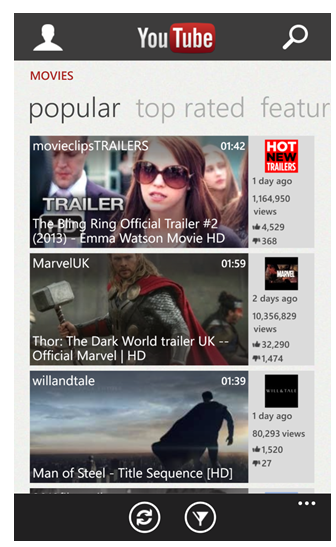Google to Microsoft: Blocking ads with Windows Phone YouTube app is a no-no

Google has sent Microsoft a cease-and-desist letter demanding Microsoft withdraw its redesigned YouTube app for Windows Phone 8 because it violates Google's Terms of Service (TOS).

The Verge first reported news of the letter, dated May 15, and included a copy of it on its Web site.
The TOS that the Microsoft YouTube app violates has to do with it blocking ads and allowing downloads of videos from Google's YouTube site.
From the letter:
"YouTube’s agreements with creators give them choices inhow their content is presented and distributed, and your application takes away that control.The YouTube Terms of Service and API Terms of Service, posted at https://www.youtube.com/t/terms and https://developers.google.com/youtube/terms, were written to protect content creators from this type of abuse. They clearly prohibit downloads of videos from the site and prohibit accessing any portion of YouTube videos by any means other than through the use of an authorized YouTube player. They also bar applications that modify, replace, interfere with or block advertisements placed by YouTube in videos."
Google is requesting that Microsoft immediately withdraw the app from the Windows Phone Store and disable existing downloads of it by May 22.
Microsoft built the new YouTube app itself, after complaining that Google was blocking access to required metadata. When I asked Microsoft officials recently if something had changed from a policy/API standpoint that allowed Microsoft to deliver this much more robust YouTube app, a Microsoft spokesperson sent the following statment:
"Windows Phone invested additional engineering resources against existing APIs to re-architect a Windows Phone app that delivers a great YouTube experience, including support for unique Windows Phone 8 features such Live Tiles and Kids Corner. Microsoft did not receive any additional technical support to create the Windows Phone YouTube app."
I reached out to both Microsoft and Google for comment on the letter. A Google spokesperson said the company was not offering any comment. No word from Microsoft so far.
Update: Microsoft's official statement via a spokesperson:
"YouTube is consistently one of the top apps downloaded by smartphone users on all platforms, but Google has refused to work with us to develop an app on par with other platforms. Since we updated the YouTube app to ensure our mutual customers a similar YouTube experience, ratings and feedback have been overwhelmingly positive. We’d be more than happy to include advertising but need Google to provide us access to the necessary APIs. In light of Larry Page’s comments today calling for more interoperability and less negativity, we look forward to solving this matter together for our mutual customers."
Update: On Twitter, @MrRajesh28 told me that Microsoft's YouTube app for Xbox does serve up ads and does not allow video downloading. With that app, there seems to be no violation of Google's Terms of Service. That makes me wonder if Microsoft decided to build the Windows Phone 8 app as part of its "Scroogled" efforts. If not, I'm curious why Microsoft did this. I've asked. If I get more information, I'll add it.
Also the timing of The Verge's report is interesting. Just minutes before it went live, Google's CEO Larry Page, during a Q&A session at the company's annual Google I/O developer conference, criticized Microsoft for taking advantage of Google by interoperating with its Google Talk messaging service and not reciprocating by providing free access to APIs for its own messaging service (presumably Skype).
The programming interfaces Microsoft used to integrate Google Talk with Outlook.com are open, but Google is in the midst of dropping support for the XMPP messaging standard with its just-announced Hangouts, which is the successor to Google Talk and Google's new cross-platform communications service .